Single-dose, virus-vectored vaccine protection against Yersinia pestis challenge: CD4+ cells are required at the time of challenge for optimal protection
- PMID: 18832004
- PMCID: PMC2628553
- DOI: 10.1016/j.vaccine.2008.09.031
Single-dose, virus-vectored vaccine protection against Yersinia pestis challenge: CD4+ cells are required at the time of challenge for optimal protection
Abstract
We have developed an experimental recombinant vesicular stomatitis virus (VSV) vectored plague vaccine expressing a secreted form of Yersinia pestis low calcium response protein V (LcrV) from the first position of the VSV genome. This vector, given intramuscularly in a single dose, induced high-level antibody titers to LcrV and gave 90-100% protection against pneumonic plague challenge in mice. This single-dose protection was significantly better than that generated by VSV expressing the non-secreted LcrV protein. Increased protection correlated with increased anti-LcrV antibody and a bias toward IgG2a and away from IgG1 isotypes. We also found that the depletion of CD4+ cells, but not CD8+ cells, at the time of challenge resulted in reduced vaccine protection, indicating a role for cellular immunity in protection.
Figures
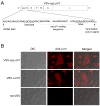
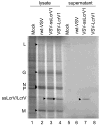

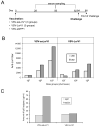
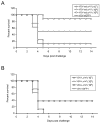

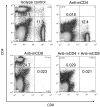
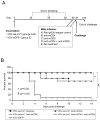
References
-
- Galimand M, Guiyoule A, Gerbaud G, Rasoamanana B, Chanteau S, Carniel E, et al. Multidrug resistance in Yersinia pestis mediated by a transferable plasmid. N Engl J Med. 1997;337(10):677–80. - PubMed
-
- Hinnebusch BJ, Rosso ML, Schwan TG, Carniel E. High-frequency conjugative transfer of antibiotic resistance genes to Yersinia pestis in the flea midgut. Mol Microbiol. 2002;46(2):349–54. - PubMed
-
- Inglesby TV, Dennis DT, Henderson DA, Bartlett JG, Ascher MS, Eitzen E, et al. Plague as a biological weapon: medical and public health management. Working Group on Civilian Biodefense Jama. 2000;283(17):2281–90. - PubMed
Publication types
MeSH terms
Substances
Grants and funding
LinkOut - more resources
Full Text Sources
Medical
Research Materials

